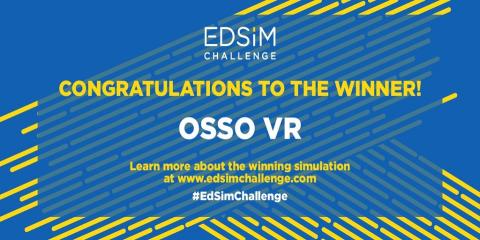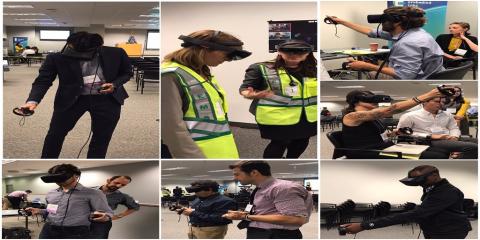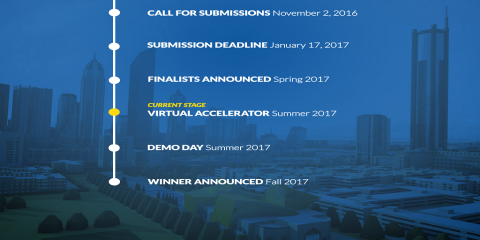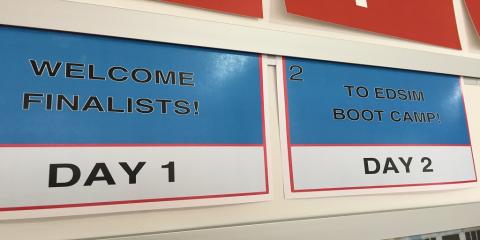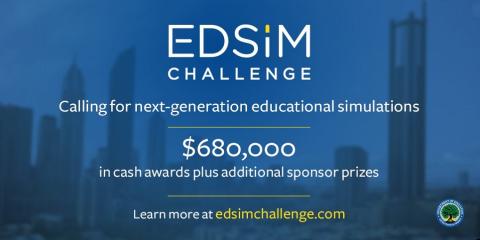About the Challenge
Simulated environments, such as virtual and augmented reality, 3D simulations, and multiplayer video games, are emerging approaches to deliver educational content. Research indicates that simulation-based learning provides students with enriched experiences in information retention, engagement, skills acquisition, and learning outcomes.
As such, the EdSim Challenge sought next-generation educational simulations that strengthen academic, technical, and employability skills. The Department was most interested in immersive and engaging simulations that include clearly defined learning goals and build diverse skill sets.
The purpose of this Challenge was to stimulate the marketplace for computer-generated virtual and augmented reality educational experiences that combine existing and future technologies with skill-building content and embedded assessment. The developer community is encouraged to make aspects of simulations available through open source licenses and low-cost shareable components.
At a Glance
Awards
$680,000
5 finalists received $50,000 and 1 grand prize winner received $430,000
Schedule
Nov - Dec 2015: Public Comment
Nov 2016 - Jan 2017: Open Submissions
Spring 2017: Finalist Announcement
Jun - Sep 2017: Bootcamp, Virtual Accelerator, and Demo Day
Oct 2017: Winner Announcement
Submission
Next-generation immersive and engaging educational simulations that include clearly defined learning goals and build diverse skill sets.
See full Submission Form here (PDF).
OCTAE Contact
Public Feedback
A call for public feedback, which took place from November 4 to December 9, 2015, helped to shape the Challenge and generate qualitative data that would inform Challenge design. The comprehensive and diverse feedback showed that at a high-level, most respondents see the EdSim Challenge as an opportunity to publicly showcase best-in-class examples of highly engaging classroom simulations that provide needed training in critical thinking, problem solving, and other employability skills.
Following the Call for Public Feedback, a panel of industry experts reviewed public feedback and convened to deliberate on key Challenge design questions. Both public engagement and expert consensus made the case for a Challenge structured to produce a playable prototype simulation that is targeted to educational and career-path needs, with a viable path to procurement and implementation by a broad variety of school districts. Experts emphasized that solvers should be guided toward early thinking around technical components, data handling, assessment of learning outcomes and preliminary business models, but that the initial submission should have a low barrier to entry.
The expert panel included:
Shelly Blake-Plock, CEO, Yet Analytics, Inc.
Curtis Blais, Research Associate, MOVES Institute at Naval Post Graduate School
Phaedra Boinodiris, Global Lead for Game Development Ecosystem, IBM
Robert Chadwick, Systems Engineer IV, Advanced Distributed Learning
Barbara Chamberlin, Professor and Extension Educational Technology Specialist, New Mexico State University
Drew Davidson, Director of the Entertainment Technology Center, Carnegie Mellon University
Nicholas (Nick) DiCarlo, Vice President and General Manager of Immersive Products & Virtual Reality, Samsung Electronics America
Joan Hughes, Associate Professor of Learning Technologies, University of Texas at Austin
Jacquelyn (Jacki) Ford Morie, Founder, All These Worlds
Jonathan (Jono) Poltrack, Director of Operations / Tech Team Co-Lead, Advanced Distributed Learning
Michelle Riconscente, President, Designs for Learning
David Solomonoff, CEO, Zoetic Networks LLC
The Federal Register posting is the governing document for the EdSim Challenge, please read for additional details.
See the full Challenge Rules, Terms, and Conditions here (PDF).
Osso VR is a highly-mobile surgical training platform that enables healthcare professionals to practice cutting edge techniques through realistic, hands-on simul
Case Western Reserve Univeristy
Holographic Applications to Transform Learning uses holographic display technology, such as the Microsoft HoloLens, with multiple students to advance medical educational experiences and outcomes.
Embodied Labs is an embodied patient experience lab that uses virtual reality to train students to become better caregivers of aging populations.
The Irregular: A Mystery at Baker Street is a VR experience that uses critical thinking, problem solving, and teamwork to explore skills related to success in STEM fields.
LifeCraft explores the story of life on Earth with VR voyages through biology, archaeology, astronomy, and beyond.








